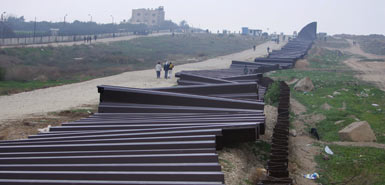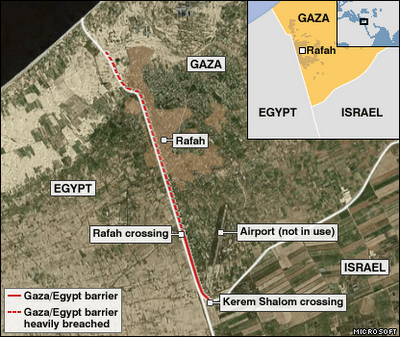From
M & C.
'Will there be another war this summer?' is a question frequently heard in Arab capitals these days.... Secret, indirect peace talks between Syria and Israel - held since April 2007 with Turkish mediation and publicly confirmed by Turkey and Syria for the first time last week - make no sense at all in this context. Or do they? Arab commentators conjecture that Israel's Prime Minister Ehud Olmert is negotiating with Syrian President Bashar al-Assad over the return of the Israeli-occupied Golan Heights in order to break Syria's tight embrace with Iran, Israel's archenemy. A commentator from the pan-Arab newspaper al-Hayat wrote that by concluding a peace treaty with Syria, Israel could 'strike Iran in the middle of the heart' and also weaken Hezbollah, which is said to be still getting Iranian weapons via Syria. |
If this peace treaty is successful, Assad would get the Golan Heights back, end international isolation, and possibly stave off any further investigation of the Rafik Hariri murder. Israel would get a peace treaty with a as yet unfriendly neighbor to the northeast which would theoretically also weaken Hezbollah in Lebanon resulting in a secure north. There exists a lot of win-win in this agreement for both sides. The fact that a deal has not been struck between the two parties has probably less to do with the benefits both sides would gain from a treaty then the distrust of each of the participants for the other side.
The treaty with Syria would allow Israel to focus on the Iranian nuclear issue without worrying about attacks from the North since Syria would theoretically not violate a new agreement and risk loosing the Golan Heights again. In turn, Hezbollah's power would be greatly reduced without a big brother resupplying them. We need not forget the fact that while Hezbollah did a good job of thwarting an Israeli offensive, they themselves never went on the offensive. Specifically, Hezbollah is a purely defensive entity. The only thing they could do to Israel is fire a whole bunch of rockets into Israel. Doing so without Syrian support would be risky. Once Israel finished with Iran, they could turn their Air Force back onto southern Lebanon.
Undoubtedly, Iran knew these negotiations were ongoing which begs the question. What was their reaction?
Amir Taheri reported earlier that PM Maliki did not move into Basra on the offensive, but it was instead a defensive maneuver aimed at limiting Iranian consolidation of power in the south. If true, Iran's reaction was to consolidate power across Southern Iraq extending the Persian reach to Jordan in its quest westward towards the Mediterranean. If successful, this advance would have surely reduced the likelihood of Assad negotiating a peace with Israel. However, it proved unsuccessful. Iran is now weakened and within a few weeks, we hear of secret negotiations between Syria and Israel. In addition, attacks against Iranian sponsored groups, namely the Mahdi Army, continue in their strongholds of Sadr City and Basra, further weakening Iranian efforts across Iraq.
Turkey is not only a mediator, but it is an active participant as it cleans up the PKK problem in the north. While no state in the region wants a fully independent Kurdistan, one which is part of a greater Iraq is less threatening and acceptable for not only states, but apparently the Kurds also. Complete independence for Kurds can be something worked out in decades to come.
Last December (2007) PM Maliki's government signed a "memorandum of agreement" with the Kurdish and Sunni leaders which layed the groundwork for the continuation of PM Maliki reign after national elections in 2009. His recent action into Basra not only further consolidated his power in Iraq with the Kurds and Sunnis, but also limited Iranian influenced control in the South which is why the Sunnis just came back to the government.
Currently, Iraqi diplomats are in Iran proving to the government Iranian sponsored unrest in Iraq. While Iran can continue to deny, the fact that Iraqi officials are showing the Iranian leaders what proof they have is significant in and of itself. It shows the international community, and more importantly Sunni dominated countries bordering Iraq in the Middle East, that while Iraq will be Shiite dominated from now on, it will not be a puppet of Iran. Why is all this important?
In order for a Shiite led Iraq to persist for decades to come, the Iraqi leadership has to show its neighbors it is not a puppet of Iran else it will be in constant conflict with its Sunni neighbors, most notably Saudi Arabia, Kuwait, Jordan, and Turkey. Preventing Iranian control in the south clearly showed Sunni neighbors this fact which is why Iraqi Sunnis shortly afterward returned to the government. Showing Iran directly further proves this point, not to Iran who knows darn well what it is doing in Iraq, but to Iraqi's Sunni neighbors. The uncertainty of continued US presence in the region is only intensifying this diplomacy since that the US sponsored surge has allowed the Iraqi government the breathing room to consolidate power and grow its Army to defend not only its borders, but its interior.
I have stated before The Battle of Basra completely changed the dynamics in the region. The new dynamics are now starting to show themselves. Iran is becoming further isolated which is what all Middle East players wanted. Iraq is showing its independence from Iran and is building up its future role as a mediator between Sunni dominated governments and Iran in the future. No government, not even an uncommitted US has the military to take over Iran; hence, the only way to prevent further confrontation in the Middle East is to continue diplomatic pressure on Iran to further isolate it, just like Syria for the last few years. Syria, seeing the writing on the wall, is closer to peace with Israel in hopes of resecuring control of the Golan Height.
The sacrificial lambs in these latest developments are the Mahdi Army, Hezbollah, the PKK, and Al Qaeda. The beneficiaries are a stable democratic Iraq, a stable democratic Lebanon, a stable Turkish southern border which is doing a banner business with the Kurdish north who can focus its efforts on getting into the EU, a Syria which will be allowed back in the international community, Saudi Arabia and Jordan which no longer have to worry about a strong extremist salafist movement within their borders or a strong Shiite Theocracy in the east, and finally a free-independent Israel which can in the near term focus on Iranian nuclear aspirations and then later on an independent West Bank now that it has a new peace treaty with a former unfriendly neighbor, Syria.
While none of this could have been planned in March 2003 when the United States went to war in Iraq, it was a major tenet of the Bush Doctrine that a democracy in the heart of the Middle East would lead to a more friendly and stable Middle East. If even half of the above comes to pass, the invasion of Iraq would have accomplished its objectives.
The trouble makers of the Middle East will have been tamed. Iraq was made into a democracy. Syria is being turned away from Iran. Iran is being further isolated with not only enemies on its borders, but now US friendly enemies on its borders. Israel is seeing more friendly neighbors in a democractic Lebanon, a peace wanting Syria, and a Saudi government who, below the scenes, is cooperating with them against terrorists. Saudi Arabia is also able for the first time to confront Wallabism as intellectual turbulence created by a violent Al Qaeda has Muslims the world over wondering how they created a force which kills not only fellow Muslims but also innocent women and children. Simultaneously, the Great Satan, the United States, has gained international respect since it is shouldering the military burden of cleaning up the mess which was the Middle East.
Not a bad two terms for President Bush to say the least. The battles currently ongoing are either part of World War IV, continuing battles of the Cold War, or the final battles of World War II, but that is for another article. Whichever proves to be correct, it is why I have always stated that we are doing the Lord's work in with military operations Iraq and Afghanistan and diplomatic operations in the Middle East. Thank God President Bush had enough faith to not listen to defeatist liberals who wanted to pull defeat from the jaws of victory and defiantly executed a surge of forces in Iraq which again, by everything above, has been a resounding success, not only for Iraq, but the greater Middle East, which by the way, was exactly what was intended as part of his Greater Middle East Initiative, which most pundits would say failed, or has it.....
Labels: Iran, Iraq, Lebanon, Middle East, Saudi Arabia, Syria, Turkey




